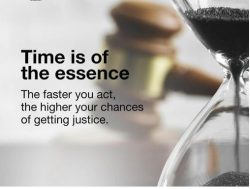What is the Fundamental Rights Enforcement Procedure and what is its purpose?
The Fundamental Rights Enforcement Procedure allows you to challenge human right violations in Nigeria. This means that is a violation has occurred or is likely to occur, you can go to court and ask for measures to remedy the violation or prevent a violation from happening.
The rules for this procedure are set out in the Fundamental Rights Enforcement Procedure Rules 2009. These contain the steps and rules for commencing an action for the enforcement of Fundamental Human Rights in Nigeria.
The rules were created by Section 46(3) of the Nigerian Constitution.
What are the objectives of these rules?
Section 3 of the Fundamental Rights Enforcement Procedure Rules lists the main purpose of this procedure:
(a) To advance and realise the human right and freedoms which are listed in Chapter IV of the Nigerian Constitution, as well as in the African Charter. This means that there are a list of human rights that are protected by this procedure and that before going to court you have to check your violated right is listed in Chapter IV of the Nigerian Constitution or in the African Charter. More on this can be found below.
(b) To ensure the advancement but never the restriction of the applicant’s rights and freedoms, by the Court’s respect of municipal, regional and international bills of rights. This means that if you go to court, the court cannot in its decision limit human rights. It must instead have an approach in its decision making that respects human rights.
(c) For the Court to be able to make consequential orders as may be just and expedient to ensure the advancement but never the restriction of the applicant’s rights and freedoms. This means that the court can in its decision make orders which have to also protect human rights rather than restrict them.
(d) For the Court to proactively pursue enhanced access to justice for all classes of litigants, especially the poor, the illiterate, the uninformed, the vulnerable, the incarcerated, and the unrepresented. This means that vulnerable groups are specially protected by this procedure.
(e) For the Court to encourage and welcome public interest litigations in the human rights field and ensure that no human rights case is dismissed or struck out for want of locus standi: Most court procedures have strict requirements to determine who can make a complaint. In this case, this means that the court will have a more open approach and accept complaints from a wide range of people.
(f) To advance Nigerian democracy, good governance, human rights and culture, pursue the speedy and efficient enforcement and realisation of human rights.
(g) To ensure that human rights suits are given priority in deserving cases. Where there is any question as to the liberty of the applicant or any person, the case shall be treated as an emergency: This means that human right complaints are to be given priority. In cases where a person is detained or his or her freedom is restricted, then these cases must be resolved as a matter of emergency.
All of these objectives reflect a duty by the courts to be open to individuals making complaints and proactive in protecting human rights.
Can I make a complaint using the fundamental rights enforcement procedure for the violation of any human right?
No. Only the violation of some rights can be taken to court. There is a list of rights that can be protected in court which contains many rights, but not all.
According to the Order II Rule 1 of the Fundamental Rights Enforcement Rules:
Any person who alleges that any of the Fundamental Rights provided for in the Constitution or African Charter on Human and Peoples’ Rights (Ratification and Enforcement) Act and to which he is entitled, has been, is being, or is likely to be infringed, may apply to the Court in the State where the infringement occurs or is likely to occur, for redress.
This means the procedure can be used to challenge violations of:
-Any of the rights in Chapter IV of the 1999 Nigerian Constitution, such as right to life, right to liberty, right to a fair hearing, right to dignity of human persons, right to private and family life, right to freedom of thought,
conscience and religion, right to freedom of expression, right to peaceful assembly and association, among others.
-Any of the rights in Chapter 1 of the African Charter on Human and Peoples’ Rights, which are similar to the rights above, except those excluded in Chapter II of the 1999 Constitution, which include the economic, social and cultural rights, such as right to work, to education, etc.
|
Do I have to wait for a violation of my right to happen before I go to court?
No.
At what point can I start a process to ensure enforcement of my rights?
You do not have to wait until after an actual violation your rights. If there is a threat to violate or likelihood of violating the right is enough reason to go to court. It is advisable to begin enforcement processes as soon as possible.
Is there a time limit for the commencement of an action under this procedure?
Order III Rule 1 of this procedure states that an application for the enforcement of fundamental right shall not be affected by any limitation statute whatsoever.
This means that you may bring actions to challenge human rights violation within any length of time or period.
However, it is advisable you bring a lawsuit as early as possible, to preserve the necessary evidence that may support a decision in your favor (such as death of witnesses, missing records, loss of memory to remember crucial events, etc).
